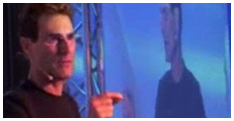Financial Times article – Lunch with FT – November 06, 1999
Article in the Financial Times, November 06, 1999
LUNCH WITH THE FT:
The weirdest thing about Uri…
I am in the pink and gold lavatory at Uri Geller’s mansion by the Thames in Berkshire. From its seat, moulded into the shape of a giant puce shell, I can see images of myself reflected and re-reflected in the multiple mirrors that line the walls and the ceiling.
I have not met the world-famous spoon-bender yet, but already I am feeling slightly spooked. So far I have only met Shipi, his brother-in-law cum butler cum accountant cum personal assistant, who has shown me the loo and then settles me into the sitting room.
This reeks of incense and on every surface are crystals and knick-knacks given by grateful people whose spoons he has bent and minds he has read over the past three decades.
Presently Geller strolls in, ludicrously youthful with a long thin body and a long thin head. He can’t be 52.
“So,” he says, giving a gleaming white smile. “What is this exactly?”
I explain about Lunch with the FT.
For a moment he looks put out, and asks if this involves actually having lunch. When I say it does, he calls for Shipi and asks if some bread and humus could be rustled up. In the meantime, he suggests a stroll outside.
In the bright sunshine Geller’s hair has an artificial metallic tinge. Maybe he is 52, after all.
As we pace the manicured lawns, and inspect the Monet-style bridge he has had built next to a large religious relic imported from Japan, he tells me how he was meant to have been on that fated train to Paddington that crashed, killing about 30 people.
“We’ve always taken the train. But that day Shipi said: ‘Let’s not take the train. Let’s get the BBC driver to pick us up.’ “
Hang on – isn’t it meant to be Geller who is having these premonitions? Not Shipi.
Geller shrugs. “Because I am so open-minded, I try to find a cosmic connection to everything. Let’s go eat.”
He leads me through a succession of marble-floored lounges and a kitchen where various pedigree dogs and his wife are lurking, into a conservatory with a view of the swimming pool.
“This is where I cycle and I write,” he says, pointing at an exercise bike with a manuscript attached to it. Every day at 5am, he gets on this thing, cycling 30 miles or more.
“These are my fan letters. And there are the papers I read every morning. I get all the papers.”
I look at the pile. I can’t see the FT.
“Ah,” he says. “It is not there. And I’ll tell you why. This is an interesting angle for you.”
While I await the interesting angle, his wife comes in bearing dishes. Humus. Salad. Mushroom pasta. Something in bread crumbs. Tabbouleh. It is quite a spread. She is nice looking with a long-suffering air about her. She puts the food down and goes away.
“These are all vegetarian dishes,” announces her husband. “Eat.” He starts to spoon the food on to my plate. His remains empty.
“I don’t read financial papers,” he goes on. “I’ve always had a negative reaction to the financial life of Uri Geller.”
What did he mean? And why was he talking of himself in the third person?
“I have found that finance and spirituality do not mix. For 30 years I have not signed a cheque. I have credit cards but I don’t use them. Shipi does all that. I haven’t carried a wallet in 28 years. Shipi! Can we have bread please?”
So he tells me how poor he was as a kid in Tel Aviv and how it was money rather than fame which caused his bulimia.
“Uri Geller being in the spotlight was natural for me. When I finished the Israeli Paratroopers, I became a male model. Suddenly I found myself full-page – lying on a towel.”
He also found it natural to be mobbed by 200 photo-graphers after having bent a spoon for the first time on BBC television in the early 1970s. What was not natural was the cash.
“I bought myself limousines. Travelled in private jets. I went to the Savoy Hotel and said to the waiter: just bring me everything. They lined up jellies, profiteroles gateaux and ice-creams. And I would eat everything. I thought – hey, wait a minute! I am going to be fat. So I excused myself from the table. Went to the toilet and vomited. I didn’t realise it was the beginning of a serious addiction.”
After a year of throwing up five times a day, he deployed his powers and stopped, just like that. Having healed himself, he feels he has the right experience to have written Mind Medicine*, his 15th book and the one we are meant to be discussing.
The volume is all about finding inner peace. But I think of Geller and the manic cycling and the pages of achievements chronicled on his web site. It does not sound like inner peace to me.
He shrugs.
“I write eight columns. But that is because I love it. I am a creator. I love writing novels, and I churn them out quickly.”
I ask if his novels have sold well, and for the only time during our lunch he hesitates. He then says how cross he is that literary London is too snobbish to rate him.
“I’m a damn good writer! I know I create great novels! In my life, things happen to me. They float across my eyes.”
The other day he was telephoned by an Israeli advertising agency asking him to do a campaign for the electricity company. So he boards an aircraft, bends a couple of spoons for the pilot, looks at the sea in Tel Aviv, has an idea for another book, sees the advertising agency and flies back.
But why do it? Especially if money has this unfortunate effect on him.
“Lucy,” he sighs. “Wayderminute. Sometimes deals are very attractive financially. It’s very hard for Shipi to say no to half a million dollars, when it is work of three hours.
“Here is another thing that happened to me,” he goes on. “Two weeks ago
Michael Jackson says: ‘Look Uri, I really want to go to a synagogue.’ I say OK. I fly to New York, and take him to a synagogue. It was fantastic. It was great. Then I come back to England.”
He fixes me with his dark brown eyes, which are very close together.
“Look Lucy. I’m a religious man. I believe in God. I don’t believe in Darwinism. I think God created us. He also created a major masterplan. There was a reason – I don’t understand it – for me to take Michael Jackson to the synagogue.”
He breaks off. “Is this all right?” He looks at the food. There is still a good deal left, which is not surprising as his wife had provided enough for a whole family and he has not touched anything. I ask why he is not eating.
“I’ll eat after you leave,” he says quickly and changes the subject. His house is for sale, he says. How much, I ask. Without blinking, he says £5.5m.
Now that his son is at the London School of Economics and his daughter is nearly grown up he has decided that he doesn’t need eight bedrooms and eight bathrooms: “I want to move to something small and rustic. I’ve had it with the marble and the gold taps.”
He plans to stay in rural Berkshire but build a house from scratch. He shows me a picture of something that looks like a metal igloo which rotates on an axis with solar energy. I laugh, which wasn’t necessarily the right reaction.
So far we have been together for about three-quarters of an hour, and he has not bent a spoon or done any of his other party pieces. I haven’t asked as I thought it would be tacky.
But suddenly he says: “You have a pen? Let’s try an experiment.”
He turns away, and gets me to draw something on my napkin. I cover it with my hand, he turns back, eyes closed, and tells me to think about the image. Quickly he sketches out two circles which are half the simple flower I had drawn.
I am impressed, but it is he who supplies the exclamations: “The size of my drawing is identical! That always blows my mind.”
I ask if he gets upset when people think he is a fake.
“If you think I’m just a good magician. Fine. That’s your opinion.” He leans towards me, looking at me intently. “But don’t libel me. Don’t damage me, or else you’ll end up in court. I had to put a stop to these libels. In the end, the lawyers got all the money. But I achieved one thing. People are very careful what they say about Uri Geller today.
“Did you bring a spoon?” he asks.
I say no, and invite him to do something with my earrings instead. He declines and goes to fetch a spoon.
“Come over here. Near to the radiator. It helps if I am near metal.” He rubs the spoon and slowly at first it starts to bend. He puts it down on the table and it goes on bending for a bit on its own. He signs it and gives it to me. I say thank you but this extraordinary and inexplicable feat has left me curiously unmoved. His ways with metal are not necessarily the weirdest thing about him.
The phone goes. It is the BBC. I have been with Uri Geller exactly an hour. Now it is someone else’s turn.
Somewhat to my surprise he kisses me, and shouts as I go to collect my things: “Don’t trash the food!”
* Mind Medicine, published by Element, £20.


Latest Articles

Motivational Inspirational Speaker
Motivational, inspirational, empowering compelling 'infotainment' which leaves the audience amazed, mesmerized, motivated, enthusiastic, revitalised and with a much improved positive mental attitude, state of mind & self-belief.



















